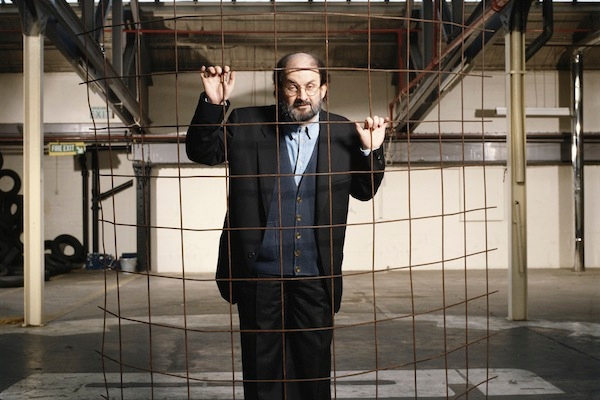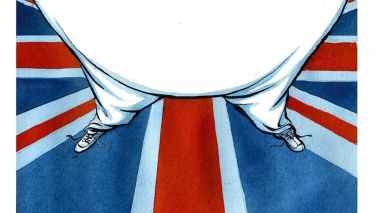One hundred pages into his absorbing new memoir, written entirely in the third person, Salman Rushdie declares that ‘Friendship had always been of great importance to him,’ since so much of his life had been spent separated, physically and emotionally, from his own family. ‘Friends,’ writes Rushdie, ‘were the family one chose.’
The conceit of third person remove can be annoying, but I understand why the author chose it for Joseph Anton, the title of the book and Rushdie’s assumed name during his long period in hiding after the Ayatollah -Khomeini sentenced him to death. As author of the allegedly blasphemous novel The Satanic Verses, Rushdie’s unhappy tale required telling through another character, since his own identity — his very life — had been stolen, first by the reactionary Iranian theocracy that wanted him punished and then by the liberal western establishment which purported to defend him but wasn’t always up to the job.
What I don’t understand, however, is Rushdie’s choice of ‘friends’, or at least his notion of what constitutes friendship in a crisis. And as his early supporter and publisher, I feel it’s important to correct and enlarge his narrative, in the name of accuracy but also in the name of friends and colleagues, unmentioned in Joseph Anton, who stuck their necks out for him when it wasn’t so easy to do.

Once Khomeini — or Khomeini’s son Ahmad, speaking for his dying father — issued the fatwa against Rushdie and ‘all those involved’ in the publication of The Satanic Verses ‘who were aware of its content’, an unseemly cowardice emerged in parts of the New York bookselling and literary world. On 16 February 1989, two days after Khomeini’s edict was announced, Waldenbooks, the country’s largest bookseller, said it was pulling the novel from the shelves of its 1,200 stores, though managers supposedly had the option to sell it from their storerooms. The Barnes and Noble and B Dalton chains halted sales altogether. It wasn’t just in England that ‘liberal opinion dithered and equivocated’, as Rushdie writes. In New York, too, the literary and publishing community was slow to rally, and it began to look as though the home of the brave was losing its collective nerve.
As publisher of Harper’s Magazine, I felt a special responsibility to act, in part because Harper’s was the only US periodical to run a pre-publication excerpt of the novel, in our December 1988 issue. But it was Gerald Marzorati, the editor who picked the section from Part IV, before the fatwa was pronounced, who first proposed that we mount a public display of support for Rushdie. I agreed, not only as a matter of principle but also to help stem the spreading panic. We thought a reading of the novel would make the biggest psychological impact, so together with Karen Kennerly and Gara LaMarche of PEN, and Helen Stephenson of the Authors Guild, we raced to organise a counterattack.
Rushdie’s most telling mistake is made in glorifying the role of Susan Sontag
Space for such an event was hard to come by on short notice, given the raw fear of hosting it but also because of insurance and security issues. Finally, a real-estate man whose name should be honoured (but I cannot remember it) offered us a loft space called The Columns, which could seat only 500 people. A security company was engaged, but… we still needed volunteers to read from the novel. My first call was to Scott Meredith, Norman Mailer’s literary agent, who hesitated (implausibly, he said that Mailer didn’t want to make himself the centre of attention), but then reason, peer pressure and ego prevailed. Most people didn’t have to be prodded, but with Mailer on board, and an extra push by authors like Gay Talese, all the requested writers agreed to show up, or at least make a public expression of support. Meanwhile, William Safire of the New York Times wrote a crucially important column denouncing Waldenbooks’ CEO, the former FBI agent Harry Hoffman, and urging Americans to patronise independent bookstores. But Safire’s piece did not immediately change Hoffman’s mind.
Rushdie’s brief version of what happened next is woefully inadequate, but his most telling mistake is made in glorifying the role of Susan Sontag, then the president of the PEN American Center. Sontag didn’t oppose holding a reading, but she didn’t do much to make it happen either. Such a detail would not be worth mentioning were it not for Rushdie’s description of the Columns gathering, again using the third person: ‘Sontag, Don -DeLillo, Norman Mailer, Claire Bloom and Larry McMurtry were among the readers. He was sent a tape of the event. It brought a lump to his throat. Long afterward he was told that some senior American writers had initially ducked for cover. Even Arthur Miller had made an excuse — that his Jewishness might be a counterproductive factor. But within days, whipped into line by Susan, almost all of them had found their better selves and stood up to be counted.’
On 22 February, the day of the reading, more than three thousand non-celebrities lined up in the drizzle on Broadway, stretching from Prince Street around the corner to Houston, eager to express their solidarity. Inside, following a caucus of the literary luminaries, each one given a passage from the novel selected by Marzorati, a last-minute obstacle presented itself. As a counter-demonstration began across from 584 Broadway and chants of ‘Death to Rushdie’ were clearly heard in the loft, Sontag, the day’s emcee, suggested to me — and I believe others heard the suggestion as well — that in the name of peace and goodwill, the writers should consider reading from works other than The Satanic Verses. Why, she asked, add fuel to the fire? I said this would subvert the purpose of the whole event — it was the right to compose the words that we were defending, not only the man who wrote them, and Khomeini was objecting to the text, not just the author. I appealed to Robert Stone, who was first in line to read because he had committed before Mailer, not to give in to Sontag’s disturbing fit of appeasement, but as Sontag introduced the programme, it wasn’t certain that The Satanic Verses was going to be read out loud in New York City.
Stone saved the day, and not while camouflaged in the third person: ‘My name is Robert Stone, but today we are all Salman Rushdie.’ As he read from the novel, clearly and succinctly, you could feel the tension lift and relief rush through the room. After that not everyone stuck to the script — some read the prepared excerpts and some simply made speeches — but Stone had done the essential. Robert Massie added steel to Stone’s heroism: authors, he said, should call on their publishers to withdraw their books from the chains. Later that day, B Dalton, owned by Barnes and Noble, announced it would resume selling The Satanic Verses.
I wish that Rushdie, imprisoned by hateful intolerance in England, could have been on hand to witness the ‘better selves’ of the American writing class and the best side of American values. But more than that I wish he would remember his friends.






Comments